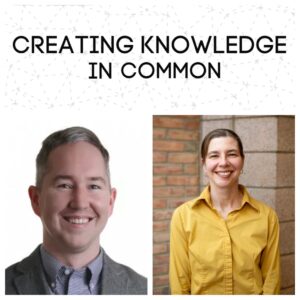Beyond Authorship: Crediting Contributors to Arts-Integrated Research with CRediT-FAIR
Dec 6, 2024 3:30-4:30pm Eastern
 While most academic publications use an authorship model, an alternative approach is contributorship. Contributorship is more inclusive and recognizes the broader set of individuals that contribute to and enable knowledge production–a boon for arts-integrated and community-engaged research! The most widely adopted contributorship model, CRediT (Contributor Roles Taxonomy), offers a high-level taxonomy that recognizes fourteen contributor roles. However, these roles are designed with bench and lab science in mind and do not account for some of the work involved in other collaborative research. In response, Ground Works has collaboratively created a version of CRediT adapted for arts-integrated research: CRediT-FAIR. For CRediT-FAIR, we have both augmented the description of some of the original fourteen roles and added four new roles to the taxonomy so as to better include arts and arts-research practices. In this webinar, we will explore the taxonomy itself and the Ground Works pilot of it for our special edition “Creating Knowledge in Common,” which features academic/community partnerships that center the arts and design.
While most academic publications use an authorship model, an alternative approach is contributorship. Contributorship is more inclusive and recognizes the broader set of individuals that contribute to and enable knowledge production–a boon for arts-integrated and community-engaged research! The most widely adopted contributorship model, CRediT (Contributor Roles Taxonomy), offers a high-level taxonomy that recognizes fourteen contributor roles. However, these roles are designed with bench and lab science in mind and do not account for some of the work involved in other collaborative research. In response, Ground Works has collaboratively created a version of CRediT adapted for arts-integrated research: CRediT-FAIR. For CRediT-FAIR, we have both augmented the description of some of the original fourteen roles and added four new roles to the taxonomy so as to better include arts and arts-research practices. In this webinar, we will explore the taxonomy itself and the Ground Works pilot of it for our special edition “Creating Knowledge in Common,” which features academic/community partnerships that center the arts and design.
Speakers
Leann Andrews
 Dr. Leann Andrews is the Stuckeman Career Development Assistant Professor in Design in the Department of Landscape Architecture at Penn State University. As a licensed landscape architect with a background in global health, ecological restoration, community design and movement arts, Dr. Andrews’ work blends the arts and sciences for social and environmental activism towards health equity. Dr. Andrews leads transdisciplinary action research and participatory design projects with underserved communities in the United States and Peru, assessing the impacts that built environment interventions have on One Health. Dr. Andrews is a co-founder of the design activism non-profit Traction, a former NIH Fogarty Global Health Scholar, a researcher with the Center for Technological, Biomedical, and Environmental Research (CITBM) in Peru, and leads the Penn State One Health Group and One Health Scholars. She is also a member of the E+D (Ecology Plus Design) Center, the Hamer Center for Community Design, and the Arts and Design Research Incubator (ADRI).
Dr. Leann Andrews is the Stuckeman Career Development Assistant Professor in Design in the Department of Landscape Architecture at Penn State University. As a licensed landscape architect with a background in global health, ecological restoration, community design and movement arts, Dr. Andrews’ work blends the arts and sciences for social and environmental activism towards health equity. Dr. Andrews leads transdisciplinary action research and participatory design projects with underserved communities in the United States and Peru, assessing the impacts that built environment interventions have on One Health. Dr. Andrews is a co-founder of the design activism non-profit Traction, a former NIH Fogarty Global Health Scholar, a researcher with the Center for Technological, Biomedical, and Environmental Research (CITBM) in Peru, and leads the Penn State One Health Group and One Health Scholars. She is also a member of the E+D (Ecology Plus Design) Center, the Hamer Center for Community Design, and the Arts and Design Research Incubator (ADRI).
Daragh Byrne
 Daragh Byrne is a founding member and Technical Director of the award winning open-access peer-review multimedia journal for arts-integrative scholarship, Ground Works. He has a PhD in Computer Applications from Dublin City University and is an Associate Teaching Professor in the Carnegie Mellon School of Architecture. He holds courtesy appointments in the Human Computer Interaction Institute and the School of Design. He co-directs the TRACES Lab on educational technology.
Daragh Byrne is a founding member and Technical Director of the award winning open-access peer-review multimedia journal for arts-integrative scholarship, Ground Works. He has a PhD in Computer Applications from Dublin City University and is an Associate Teaching Professor in the Carnegie Mellon School of Architecture. He holds courtesy appointments in the Human Computer Interaction Institute and the School of Design. He co-directs the TRACES Lab on educational technology.
Situated in Carnegie Mellon Architecture’s Computational Design program, his teaching and research is grounded in computing and technology and the relationships to interactions, experiences, space and arts-integrative practices. His work explores two main aspects of emerging technology. Firstly, the role that digital tools and environments play in augmenting learning and creativity at the intersection of art, design and technology. Secondly, he examines the issues surrounding emerging technology by making them tangible through technology prototyping.
Recent work includes an NSF-funded project (#1736189) focused on augmenting documentation in maker-based learning. This resulted in IoRef, a creativity support tool for electronics and physical computing. Other work includes Spooky Technology, a multiyear design research project that has produced an edited volume, coursework, exhibitions, prototypes and research papers.
Kevin Hamilton
 Kevin Hamilton is an artist, researcher, and administrator, and currently serves as Associate Vice Chancellor for Research and Innovation in Humanities, Arts, and Related Fields at the University of Illinois, Urbana-Champaign. A member of the Illinois faculty since 2002, his previous appointments include a term as Dean of the College of Fine and Applied Arts (2018-2024), and a role as advisor to Illinois’ Humanities Research Institute on Digital Humanities strategy. Trained as a painter, Hamilton turned in his early career to networked and digital media forms as applied in public art settings, merging historical scholarship and practice through gallery exhibition and commissioned projects. While at Illinois, he has been especially active as a collaborator with scientists and scholars, including research on bias in digital search platforms that led to a significant Supreme Court ruling (Van Buren vs. United States, 2021), and the publishing of Lookout America!: the Secret Hollywood Studio at the Heart of the Cold War (Dartmouth, 2019), a definitive history of nuclear test photography in the United States. His work has earned support and recognition from the National Science Foundation, the National Endowment for the Humanities, and the Illinois Arts Council. Hamilton also contributed to a leading white paper on recognizing community-engaged research in faculty promotion processes, and is a co-founder of Ground Works.
Kevin Hamilton is an artist, researcher, and administrator, and currently serves as Associate Vice Chancellor for Research and Innovation in Humanities, Arts, and Related Fields at the University of Illinois, Urbana-Champaign. A member of the Illinois faculty since 2002, his previous appointments include a term as Dean of the College of Fine and Applied Arts (2018-2024), and a role as advisor to Illinois’ Humanities Research Institute on Digital Humanities strategy. Trained as a painter, Hamilton turned in his early career to networked and digital media forms as applied in public art settings, merging historical scholarship and practice through gallery exhibition and commissioned projects. While at Illinois, he has been especially active as a collaborator with scientists and scholars, including research on bias in digital search platforms that led to a significant Supreme Court ruling (Van Buren vs. United States, 2021), and the publishing of Lookout America!: the Secret Hollywood Studio at the Heart of the Cold War (Dartmouth, 2019), a definitive history of nuclear test photography in the United States. His work has earned support and recognition from the National Science Foundation, the National Endowment for the Humanities, and the Illinois Arts Council. Hamilton also contributed to a leading white paper on recognizing community-engaged research in faculty promotion processes, and is a co-founder of Ground Works.
Mohammad Hosseini
 My professional life has been international and eventful, but throughout this journey, studying and promoting ethics has been the primary reason for my transitions and ultimately growth. In my current role, I explore and teach research ethics and integrity, particularly focused on ethics of team science, and ethical implications of using artificial intelligence (AI) in research, education, and healthcare. I advocate for open and transparent science and a fair recognition of individuals’ work, and through my scholarship, promote fair, accountable, and transparent use of AI and other emerging technologies.
My professional life has been international and eventful, but throughout this journey, studying and promoting ethics has been the primary reason for my transitions and ultimately growth. In my current role, I explore and teach research ethics and integrity, particularly focused on ethics of team science, and ethical implications of using artificial intelligence (AI) in research, education, and healthcare. I advocate for open and transparent science and a fair recognition of individuals’ work, and through my scholarship, promote fair, accountable, and transparent use of AI and other emerging technologies.
As a research ethics and integrity expert, I collaborate with the Galter Health Science Library, Northwestern University Clinical and Translational Sciences Institute (NUCATS) and the Institute for Artificial Intelligence in Medicine (I.AIM) on topics related to technology ethics, including AI. Externally, I am involved in, and lead various ethics projects in national and international organizations (e.g., Association of Professional and Practical Ethics, National Information Standards Organization, National Academy of Sciences, and Global Young Academy). Furthermore, I teach research ethics and integrity in the context of humanities and social sciences as well as health science research for various institutions in the US and Europe.
Veronica Dittman Stanich
Veronica Dittman Stanich holds a PhD in Dance Studies from the Ohio State University. Her interview- and observation-based research investigating audience responses to postmodern dance has been published in Dance Chronicle and Dance Research, and presented to the Congress on Research in Dance. Her work on the a2ru research team has resulted in workshops, whitepapers, and other resources concerning arts integration impacts; issues around tenure and promotion for the arts, design, and interdisciplinary practices; and interdisciplinary collaboration. Veronica is the Managing Editor of Ground Works, a2ru’s online platform for arts-integrated research.
View the Recording
